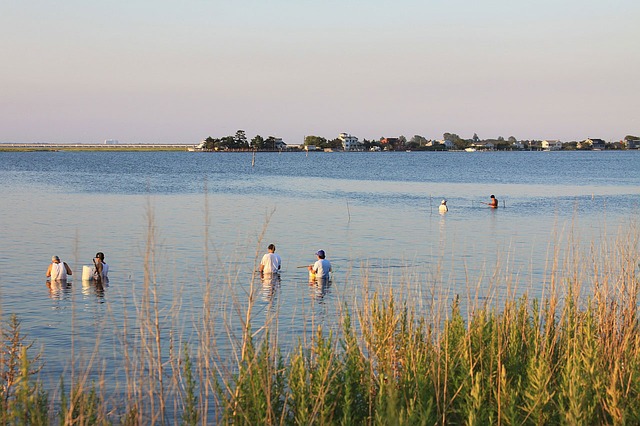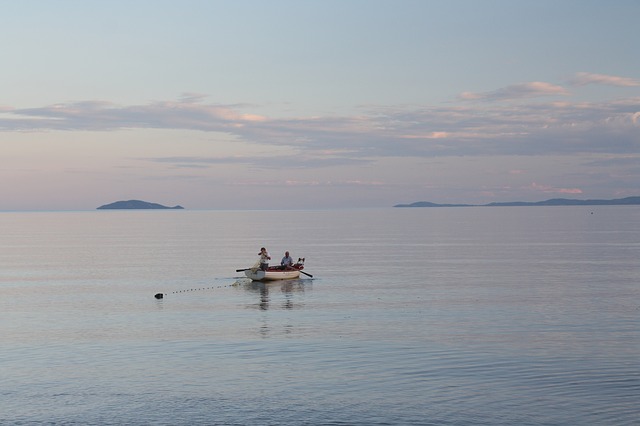
Fishing is a fun way to get outside and relax while also challenging yourself. Regardless of if you’re a beginner or an expert, good advice never hurt anyone. This article is full of advice that is useful for fishers of every level.
If you plan to fish from a boat, remember to keep safety first. The floor of the boat should be kept dry at all times. If the floor is not dry, you may fall. Dry the surface with a towel or mop prior to going into the water.
You will need a sharp hook if you plan on fishing often. A simple way to gauge the sharpness of a hook is to see if it leaves a scratch when you drag it along your fingernail. If that does not happen, replace it or sharpen it if you wish to catch additional fish.
After finding the perfect spot to fish, move slightly upstream and cast your line there. This causes your bait and hook to move past the fish. The more natural motion of the downstream drift will do a better job of attracting the fish to bite your bait. This useful technique works even better if the area happens to be underneath any type of obstruction.
Fly Fishing
Give fly fishing a go! There are a lot of good benefits when fly fishing, but it is a lot different than other fishing styles. You will have to buy different equipment and clothing if you want to be a fly fisher.
Be aware of hand odors when fishing. You do not want the bait to carry any unwanted odors that would be discernible to the fish. All the fish in the deep blue sea will scatter if they notice an unpleasant or unfamiliar smell.
If a net must be used when trying to land a fish, always net the fish head first to avoid spooking it. This method greatly reduces spooking the fish while it is being caught. Usually, it works best to use a net only if necessary.
Avoid panicking if you have hooked into a large fish. Remember not to reel it in while it swims away. Don’t exert too much pressure; let the drag created by the force of your rod do the heavy lifting. After the hook is in the fish, adjust your drag so you can reel in the fish. Your fishing rod should maintain a forty-five-degree angle with the water. It should remain aimed toward your fish.
Never panic if you have managed to hook a big fish. The fish may fight, but attempting to reel it in can break the rod. Instead, let your line out and allow the fish to expend it’s energy. When it is tired, you can reel it in gently.
Plan to take a break in your fishing at about noon. Fish are highly cautious during this period of time, and thus more unlikely to go for your bait, given the sun’s high angle. Get out of the heat and have yourself a nice lunch. When it isn’t quite as bright out, get back to fishing.

Go when the time and temperature is right to catch fish. For example, if you’re hunting bass, the larger ones are generally more active at dusk and dawn since that’s when their preferred food is most active. Just make sure the water is over 50 degrees when you’re fishing.
Catch-and-release is an ideal strategy for anyone who does not plan to actually keep and cook the fish. This is when you unhook the fish you have caught very carefully and gently put them back in the water. When you do this, you allow the fish population to grow, which makes catching fish in the future possible.
For those bigger fish you might want to use a gaff or net to catch them. A gaff will give you a good grip on the fish and allow you to haul it out of the water. A net will have the same benefits, without the risk of mangling part of the fish. This could be helpful during preparation.
When you go fishing, don’t go alone, or at least let someone know where you’re at. If you happen to have an accident or something on your boat breaks down, it’ll be a lot easier to get to safety if you’re not alone.
Never litter while fishing. Garbage and different kinds of debris floating around in the water will drive fish away. You’ll hurt your chances of actually catching fish, as well as harm the environment.
When fishing for bass it is important to understand several things. Learn the behaviors of the fish and where they are most likely to swim. It is important to mark the times when they are consistently present. Timing is essential when bass fishing.
When netting a fish be sure to do it head first. Netting from the tail gives the fish a chance at another run and could cause damage to your line.
Salted worms need to have their flavor refreshed frequently. This is even more important if you’re fishing in murky or quick-moving water. To revitalize its flavor, put it between your hands and rub it rapidly.
Keep an eye on your surroundings at all times. In order to achieve success with fishing, you should be very nature focused. Listen to the sounds of the area to get a better idea if noise is a factor in scaring off the fish. Carefully watch the water surface for signs of disturbances that might be caused by the fish. Another way to locate fish is to follow the birds that will catch fish by diving into the water.
You should now have a better understanding of what you can do to become a much better angler. So, when you head out on your next fishing trip, keep these tips in mind. If you follow the advice that has been presented, you will find yourself bringing in catches of fish larger than you ever thought possible.
